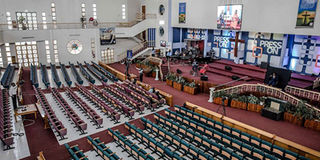OKORE: It’s time faith leaders helped people more

A pastor and a public health adviser talk about the coronavirus while live-streaming a church service at Nairobi Baptist Church on March 22, 2020. PHOTO | LUIS TATO | AFP
What you need to know:
- Faith leaders negotiating to reopen at this stage of the pandemic have, therefore, nothing to do with restoring hope in people – as they claim – but everything to do with their own interests.
- Not risking people’s lives should be a top priority if at all they cared about people but we shouldn’t forget that these are the same faith leaders who’ve demonstrated time and again that their intercessions are for sale.
If there is a group that’s been consistent about its own agenda during this pandemic period, it has to be faith leaders. Their insistence on reopening places of worship despite existing risks of increasing coronavirus spread to their congregation is appalling – but not shocking.
Their demand to have worship spaces operational shouldn’t be condoned, as it would show we haven’t learned anything from other countries where prayer gatherings led to an overnight increase in the number of infections.
In February 2020, the number of coronavirus cases in South Korea alarmingly soared to several hundreds of infected people. More than half of those infected involved members of a religious sect.
Due to this fact, faith leaders negotiating to reopen at this stage of the pandemic have, therefore, nothing to do with restoring hope in people – as they claim – but everything to do with their own interests.
Not risking people’s lives should be a top priority if at all they cared about people but we shouldn’t forget that these are the same faith leaders who’ve demonstrated time and again that their intercessions are for sale.
We’ve seen faith leaders endorse corrupt leadership as they receive huge bundles of money in the name of donations and offer cleansing without the demand for justice. We’ve seen faith leaders go tone-deaf on rape, gender-based violence, femicide, police brutality and sexual reproductive health rights. We’ve seen faith leaders abandon religious autonomy because it reduces their popularity among the ruling elite and instead seek to tame and silence the congregation.
Faith leaders have treated religion as a buffet; picking and choosing parts that suit them and neglecting those that don’t.
That said, faith leaders have an opportunity to do so much in shaping societal culture, especially now when the canvas of change is begging for their leadership. They can start by offering their houses of worship to the many Kenyans who need a safe place of refuge, like those whose houses were demolished and are now homeless; those who’ve been evicted because of tough economic times and unaffordable rent; street families who are facing harassment and brutality during curfew plus many more.
The church can equally be a helpful physical space that is focused on supporting, mobilising and organising donations of essential items for vulnerable people.
These are just a few examples of what faith leaders can do apart from merely asking to resume prayer sessions, however great they may be. They need to understand that they cannot pray away a virus. They can, however, be proactive in their leadership by catering to the needy and, for once, making the people the core of their purpose.
Scheaffer Okore is a policy analyst; [email protected]





